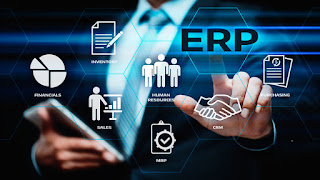Benefits of ERP Software Providers in India
ERP Software Providers in India are business software developers and providers that create, sell and implement ERP (enterprise resource planning) software systems. ERP software providers are also responsible for developing updates and additional releases to keep up with changes in their clients' industries. Examples of some ERP software are Oracle, Infor, SAP business and Microsoft Dynamics.
There are three main types of ERP software systems that function with different deployment models. These are following:
1. On-Premise ERP Software
2. Cloud based ERP Software
3. Hybrid ERP Software
Our leading ERP software providers have good knowledge about the tools and system requirements. ERP software providers can help you to meet your company goals with proven strategies. They try to optimize the ERP systems and make them compatible to adjust to a new technology. Nippon Data boasts a set of the best ERP software providers in India that have a proven record of numerous customer references and recommendations.
Choosing an ERP system can be an overwhelming task with various software solutions to select from. While choosing an ERP system, it is essential that the product addresses the issues and objectives of your organization while solving the purpose of helping to execute an ERP system. To do this you need expert ERP Providers in India, who knows all about the software and can make it work well for your company.
Benefits of ERP system
ERP systems are fruitful for the company as-
1- The real-time data and aggregated sources collected by the system help in Improving decision making.
2- Computerize core business activities, manual tasks, and detailing. Lessen human mistakes, and save time and assets
3- ERP system automation Results in Expanded profitability and productivity.
Benefits of ERP software providers
Benefits of ERP software are followings:
1. Enhanced Business Reporting:
Better reporting tools with a real-time information
A single integrated database for all business processes
2. Better customer service:
Better access to customer information
Faster response times
On-time delivery
Order accuracy
3. Improved Inventory Costs:
Carry as much inventory as needed, avoid these issues
Too much inventory, and higher overhead costs
Too little inventory, and longer customer fulfilment times
4. Boosted Cash Flow:
Better invoicing and better collections tools to bring cash in faster
Faster cash means more cash on-hand for the business
5. Cost Savings:
Improved inventory planning
Better procurement management
Better customer service
Improved vendor relationship management
6. Better Data & Cloud Security:
Dedicated security resources
Avoid installing malicious software
Data distributed across multiple servers
7. Business Process Improvements:
Automate manual or routine tasks
Implement smarter workflows
Gain efficiency
8. Supply Chain Management:
Effective demand forecasting and lean inventory
Reduce production bottlenecks
Transparency through the business
Cons of ERP Software-Important Factors & Disadvantages
Costs of an ERP Software
Third-party software add-ins
Implementation costs
Maintenance
Initial and continuous training
Complex Data Conversion
Developing a solid data conversion strategy can be difficult
You have to define, examine and analyze data sources
Bad data conversion will cause delays and increased costs
Requires thorough training
Training needs to cover all of the ERP system’s features.
ERP training sessions need to be in line with business processes
IT users need to be trained for the technical aspects of the ERP System


Comments
Post a Comment